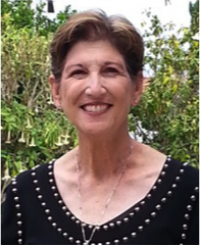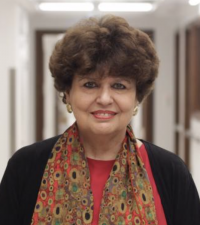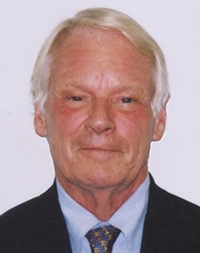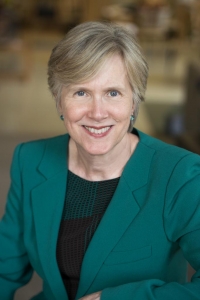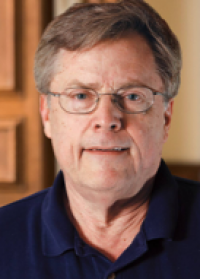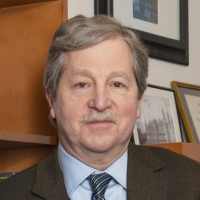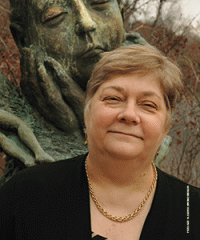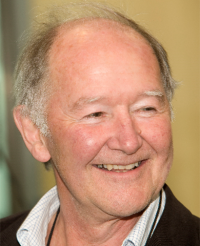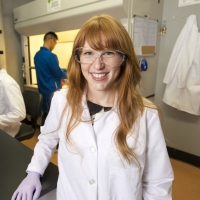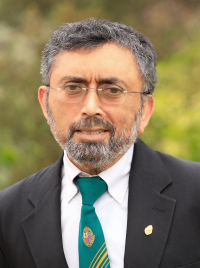Impact of Early Life Deprivation on Cognition: Implications for the Evolutionary Origins of the Human Mind
Biographical Sketches: Co-Chairs
Salk Institute for Biological Studies
Paula Tallal received her Ph.D. from Cambridge University and held academic appointments at Johns Hopkins and UCSD School of Medicine before being recruited to Rutgers University where she co-founded the Center for Molecular and Behavioral Neuroscience. While at Rutgers University she held the University’s highest academic rank, Board of Governors Professor of Neuroscience. Tallal is currently on the faculty at The Salk Institute for Biological studies. For over 40 years, Dr. Tallal has led NIH and NSF funded multidisciplinary research teams and published over 250 papers on the neurobiological basis of speech, language and reading development and disorders. She was selected by the Library of Congress to be the Commentator for the Field of Psychology at its Bicentennial Celebration. In 1996, Tallal co-founded the Scientific Learning Corporation (SCIL), a neuroscience company dedicated to developing and delivering ‘smart technologies’ broadly aimed at improving cognitive, linguistic and academic outcomes. She is the co-inventor on dozens of patents and won the Thomas Alvin Edison Patent Award for her innovative research leading to the development of the Fast ForWord® series of neuroeducational training programs.
UCL Great Ormond Street Institute of Child Health
Faraneh Vargha-Khadem is Professor of Developmental Cognitive Neuroscience at UCL Great Ormond Street Institute of Child Health. She is also the Clinical-Academic Lead for the Department of Neuropsychology at Great Ormond Street Hospital for Children, and Director of the UCL Centre for Developmental Cognitive Neuroscience.
Dr. Vargha-Khadem conducts research on the effects of early brain injury on neural circuits serving memory and learning, speech and language, spatial navigation, and movement organization. Together with her colleagues, she has made a number of discoveries, viz the syndrome of developmental amnesia, the neural and behavioural phenotype of FOXP2 gene mutation in humans, and patterns of brain reorganization in children who have undergone neurosurgery for epilepsy.
Dr. Vargha-Khadem is a Fellow of the Academy of Medical Sciences, and has received a number of national and international awards including the Jean Louis Signoret Prize for her contributions to understanding the genetics of behaviour.
Biographical Sketches: Speakers
Bucknell University
Douglas Keith Candland first read of feral children in his first-year college psychology text in the 1950s. Fifty years latter, while writing a book on how human beings project their personalities onto the animals they study, he renewed his interest in the 4,000 or more reports of feral children about whom some documentation exists. The book became Feral Children and Clever Animals. Publication of the book lead to invitations by TV documentary producers to investigate the two living such children on whom neurological measurements were taken. The investigations of these boys, John SSebvauynhaof Uganda and Victor (CauCau) of Chile, are contrasted with two earlier feral children on whom written contemporary documentation is available. These are Victor, the "Wild by of Avignon" studied in the early 19th century by Dr. Itard and the 'Wolf Girls of India" studied by Rev. Singh and Dr. Zingh during the early twentieth century.
University of Minnesota, Twin Cities
Ann Masten is the Regents Professor, Irving B. Harris Professor of Child Development, Distinguished McKnight University Professor, University of Minnesota, Twin Cities. She is known for her research on the development or resilience and for advancing theory on the positive outcomes of children and families facing adversity. Masten received the American Psychological Association Urie Bronfenbrenner Award for Lifetime Contributions to the Service of Science and Society,2014 and, served as President of the Society for Research in Child Development and of Division 7 (Developmental) of the American Psychological Association. Masten's book Ordinary Magic: Resilience Processes in Development (The Guilford Press, 2014) provides an optimistic perspective on children's natural resilience and ability to adapt to new experiences and challenging circumstances. This monograph explores how resilience can be nurtured in families, schools, and other social and community settings. It provides a guide for policy makers seeking to develop supports for children facing adversity due to poverty, family circumstances, or exposure to traumatic violence. With Barry Lester and Bruce McEwen, Masten is co-editor of the volume Resilience in Children.
Rockefeller University
Bruce S. McEwen (January 17, 1938 – January 2, 2020) obtained his Ph.D. in Cell Biology in 1964 from The Rockefeller University. He was a member of the US National Academy of Sciences, the National Academy of Medicine, and the American Academy of Arts and Sciences. He served as President of the Society for Neuroscience in 1997-98.
Research contributions: His laboratory discovered adrenal steroid receptors in hippocampus and this provided a gateway to the ongoing discovery that circulating steroid hormones and other systemic mediators affect cognition, mood and many other neural processes and the further discovery that there is structural and functional plasticity of the adult as well as developing brain, which these hormones mediate. Translational studies throughout the world are extending these findings to the human brain. Dentate gyrus neurogenesis was “rediscovered” in his laboratory and he went on to show that chronic stress reduces neuron number in dentate gyrus, and remodels dendrites and granule cell neurons in ways that differ between the sexes. Indeed his laboratory has also led the way in demonstrating mechanisms of action of gonadal steroids via the entire brain, starting with the hippocampus, via both genomic and non-genomic mechanisms. Beyond the hippocampus, he has demonstrated stress-induced remodeling of neurons of the medial prefrontal and orbitofrontal cortex as well as basolateral and medial amygdala, in which the healthy brain shows resilience after stress is over. Glutamate and glucocorticoids play a major role. This work has led translationally down a conceptual path, namely, that stress hormone effects are biphasic – protective in the short run and potentially damaging in the long run – embodied in the now widely used concepts of allostasis and allostatic load/overload that he helped to develop. At his death, his laboratory was looking at epigenetic effects of acute and chronic stressors on depression- and anxiety-related behavior, as well as cognitive functions, in order to investigate the actions of putative rapidly acting antidepressant drugs in which glutamate overflow plays a role. They also found that slowing glutamate overflow by enhancing reuptake has a protective role in aging and may slow the neuroinflammatory process and the rate of neurodegeneration in Alzheimer’s disease.
Collaborative transdisciplinary research: He served on the MacArthur Foundation Research Network on Socioeconomic Status and Health, in which he helped to reformulate concepts and measurements related to stress and stress hormones in the context of human societies, which led to the concept of “allostatic load and overload” that describes the wear and tear on the body and brain from chronic stress and related lifestyle behaviors that lead to dysregulation of physiological stress pathways that are normally protective. He was also a member of the National Council on the Developing Child which focuses on biological embedding of early life experiences and promoting healthy brain development. He was the co-author of a book with science writer, Elizabeth Lasley, for a lay audience called “The End of Stress as We Know It”, published in 2002, and “The Hostage Brain” with science writer, the late Harold M. Schmeck, Jr., published in 1994, both of which are now available as eBooks.
Boston Children’s Hospital/Harvard Medical School
Charles A. Nelson III, PhD, is currently Professor of Pediatrics and Neuroscience and Professor of Psychology in the Department of Psychiatry at Harvard Medical School, and Professor of Education in the Harvard Graduate School of Education. He also holds the Richard David Scott Chair in Pediatric Developmental Medicine Research at Boston Children’s Hospital. His research interests center on a variety of problems in developmental cognitive neuroscience, including: the development of social perception; developmental trajectories to autism; and the effects of early adversity on brain and behavioral development. He chaired the John D. and Catherine T. MacArthur Foundation Research Network on Early Experience and Brain Development andserved on the National Academy of Sciences (NAS) panels that wrote From Neurons to Neighborhoods, and more recently, New Directions in Child Abuse and Neglect Research. Among his many honors he has received the Leon Eisenberg award from Harvard Medical School, an honorary Doctorate from Bucharest University (Romania), was a resident fellow at the Rockefeller Foundation Bellagio Center (Italy), has been elected to the American Academy of Arts and Sciences, the National Academy of Medicine, and received the Ruane Prize for Child and Adolescent Psychiatric Research from the Brain & Behavior Research Foundation.
Georgetown University Medical Center
Dr. Newport received a Ph.D. from the University of Pennsylvania in 1975. She was a member of the faculty in the Department of Psychology at the University of California, San Diego and the University of Illinois before joining the faculty at the University of Rochester, eventually serving as the George Eastman Professor of Brain and Cognitive Sciences.
In July of 2012, she joined the faculty at Georgetown University where she currently serves as the director of the Center for Brain Plasticity and Recovery.
Dr. Newport has been recognized by a number of organizations for the impact of her theoretical and empirical contributions to the field of language acquisition. She has been elected as a fellow in the Association for Psychological Science, the Society of Experimental Psychologists, the Cognitive Science Society, the American Association for the Advancement of Science, the American Academy of Arts and Sciences, and the National Academy of Sciences. Her research has been supported by grants from the National Institutes of Health, the National Science Foundation, the McDonnell Foundation, and the Packard Foundation. In 2015 she received the Benjamin Franklin Medal in Computer and Cognitive Science.
Dr. Newport runs the Learning and Development Lab, which studies the acquisition of language, the relationship between language acquisition and language structure, and the Pediatric Stroke Research Project which studies the recovery of language after damage to the brain early in life.
University of Bristol
Marcus Pembrey is a clinical geneticist and now Emeritus Professor of Paediatric Genetics at UCL Great Ormond Street Institute of Child Health, UK. He is visiting Professor of Paediatric Genetics at the University of Bristol, where he was Director of Genetics within the Avon Longitudinal Study of Parents and Children (ALSPAC) from 1989 - 2005 and continues his research. His current research is focused on how human developmental variation is influenced by transmission of information (independent of DNA sequences) linked to the early-life experiences of parents and grandparents. He was previously Adviser in Genetics to the Chief Medical Officer at the UK Government's Department of Health, President of the European Society of Human Genetics in 1994-5, and co-founder of the International Federation of Human Genetic Societies. He is a Fellow of the UK Academy of Medical Sciences.
UC Davis
Danielle Stolzenberg is currently an Associate Professor in the Department of Psychology at UC Davis and an affiliate member of the UC Davis Center for Neuroscience. She received her B.S. in psychology from Stetson University in 2003, completed her Ph.D. in behavioral neuroscience at Boston College in 2009, and trained as a post-doctoral scholar from 2009-2012 at the University of Virginia. Broadly her research has investigated neural mechanisms involved in the onset and maintenance of maternal behavior in rodents. Her laboratory is currently focused on understanding how genetic and epigenetic mechanisms mediate experience-dependent changes in caregiving behavior.
UC San Diego School of Medicine
Ajit Varki is a Distinguished Professor of Medicine and Cellular & Molecular Medicine, Emeritus Co-Director of CARTA, Emeritus Co-Director of the Glycobiology Research and Training Center at UC San Diego, and Adjunct Professor at the Salk Institute. He received basic training in physiology, medicine, biology, and biochemistry at the Christian Medical College (CMC), Vellore, The University of Nebraska, and Washington University in St. Louis. He also has formal training and board certification in internal medicine, hematology, and oncology. Varki is the executive editor of Essentials of Glycobiology (Cold Spring Harbor Press, 4th Edition, 2022) and is recipient of a MERIT award from the NIH, and an American Cancer Society Faculty Research Award. Honorific elections include the American Academy of Arts and Sciences, the National Academy of Medicine, the American Society for Clinical Investigation, and the Association of American Physicians. He is also recipient of the three highest honors in his field, the Karl Meyer Award of the Society for Glycobiology, the International Glycoconjugate Organization Award and the Rosalind Kornfeld Award for Lifetime Achievement in Glycobiology. He is recognized for creating the first major open access research journal (J. Clin. Invest., 1996) as well as the first major open access textbook (Essentials of Glycobiology, 2009). He was honored with the Old Cottonian of Eminence Award at the 150th Anniversary of Bishop Cotton Boys School, Bangalore, India, (2015) as well as a Distinguished Faculty Medal and Oration at his medical school alma mater, CMC, Vellore. Significant past appointments include: Co-Head, UC San Diego Division of Hematology-Oncology; President of the Society for Glycobiology; Editor-in-Chief of the Journal of Clinical Investigation; Interim Director of the UC San Diego Cancer Center, President of the American Society for Clinical Investigation, and UC San Diego Associate Dean for Physician-Scientist Training. Varki's research interests are focused on a family of cell surface sugars called sialic acids, and their roles in biology, evolution and disease. Currently, active projects are relevant to the roles of sialic acids in microbial infectivity, the regulation of the immune response, the progression and spread of tumors, aging, and unique aspects of human evolution. His group is particularly intrigued to find multiple interrelated differences in sialic acid biology between humans and our closest evolutionary cousins, the "great apes." These differences are a signature of the events that occurred during the last few million years of human evolution, and appear to be relevant to understanding several aspects of the current human condition, both in health and disease. Varki’s book, Denial (Twelve, Hachette Books, 2013), explores a novel "Mind Over Reality Transition” (MORT) theory that denying reality and personal mortality was a key step in allowing the emergence of a full theory of mind, and in the origin of our species.
